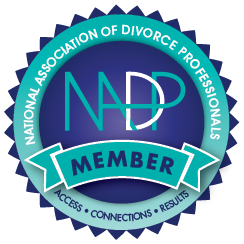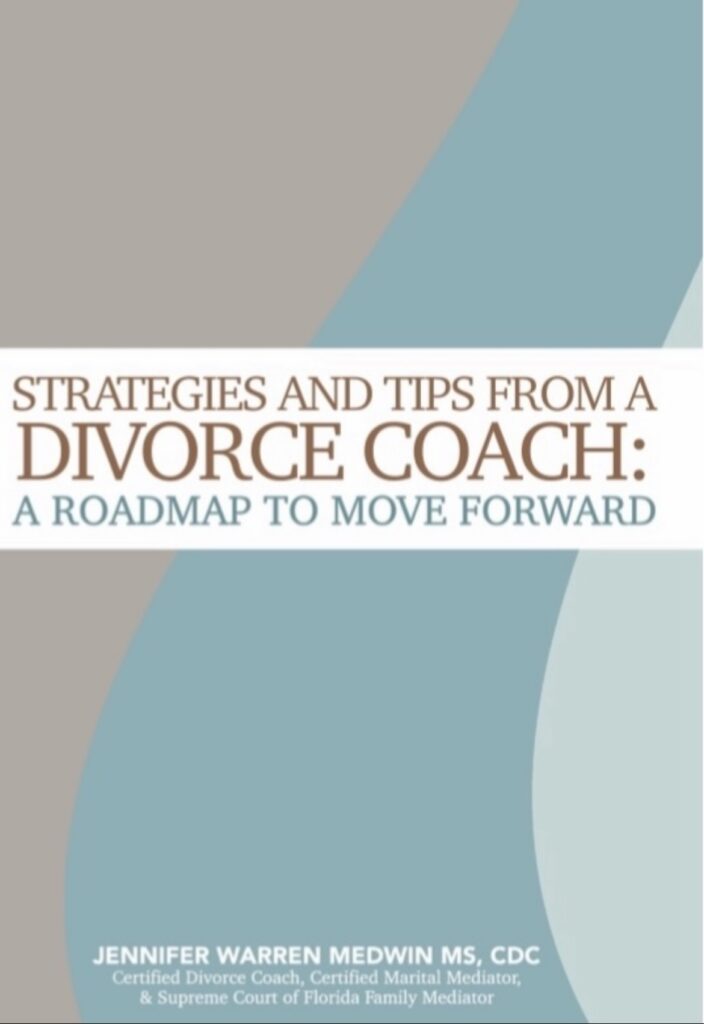but the ability to cope with it.
Coping Strategies
Eat Right
Stress levels and a well-balanced diet are closely connected. When people are overwhelmed, they often forget to eat in a healthy way or they overeat. Eating right can help you maintain a healthy weight, avoid certain health problems, and influence your mood and sense of wellbeing. Eating more fruits and vegetables, cooking meals at home such as fish with high levels of omega 3 fatty acids, and reducing your intake of sugar and refined carbohydrates can help improve your mood and lower your risk of depression, stress, anxiety, and other health problems.
As your personal divorce coach, I will encourage and remind you to fuel your body with the nutrients it needs to stay healthy and focused.
Practice Positive Self-Talk
Positive affirmations are very powerful statements used during self-talk that can influence and change your attitude, behavior, and habits. They provide you with the opportunity to move forward with your own personal growth. Positive thoughts raise motivation and energy. They help you to manage stressful situations and foster a healthy lifestyle. With a positive state of mind, you have a better outlook to handle life’s challenges in a more constructive way. Affirmations help refine your focus and generate creativity, which is the first step when trying to accomplish any goal.
A daily practice of positive affirmations will help keep you surrounded by the things you want in your life. Consistently repeating your desires and putting aside the hesitant feelings that hinder you will be instrumental in achieving the positive results you long for.
As your personal divorce coach, I will help you develop skills to enhance your outlook on life.
Sleep Better
Stress can cause you to lose sleep. Unfortunately, lack of sleep is linked to stress. Try as best as you can to get the doctor recommended 7-8 hours of sleep per night. Turn your television off earlier, dim the lights, put your electronic equipment away, and give yourself some time to relax before going to bed at night.
As your personal divorce coach, I will support you in developing healthy sleep habits.
Focus on the Present
Meditation
When you meditate you focus your attention on things that are happening right now. It helps you take a deliberate break from the stream of thoughts that are constantly flowing in and out of your mind. In practicing meditation, your pulse, breathing, and heart rate slow down. During meditation, your muscles relax and your mind begins to enjoy the peace that comes from the silencing of your racing thoughts. Paying attention to your breath, practicing mindfulness based stress reduction, and using guided imagery are three very common forms of meditation.
- Deep Breathing
Deep breathing can be performed anywhere and at anytime. Focusing on full, cleansing, rhythmic deep breaths is a simple and powerful relaxation technique. It helps turn your mind inward and promotes calm. The more oxygen you get in your system, the less tense, short of breath, and anxious you feel.-
- Mindfulness
Mindfulness is a way of observing what is going on in life from a more objective and relaxed point of view. The practice allows the human spirit the time and space to consider various options in a more balanced and open-minded way. It is like a muscle that needs to be strengthened through consistent training. Mindfulness requires a hyper alert awareness of the present moment and to what is occurring in the here and now. Many individuals focus on their breath to create a more alert and calm state. The breath is an anchor and is always patiently waiting to be heard. It is the one tool that is always with you to help enhance your practice. The goal is to simply to monitor your emotions and thoughts as they occur with no judgment. Staying in the moment, keeps the situation in perspective so one can choose words, thoughts, feelings, and actions more rationally and therefore effectively. People cannot heal what they don’t allow themselves to feel. Whatever comers up, focus on dealing with it with warm acceptance. -
- Guided Imagery
Visualization is a gentle and powerful technique that focuses and directs your imagination in a specific and positive way. The technique involves the entire body, the emotions, and all of the senses. Visualization uses the power of the imagination to reach a deep state of relaxation and emotional calm. It involves imagining a scene in which you feel at peace and free to let go of all tension and anxiety. Visualization has a positive impact on your health, creativity, and performance.
As your personal divorce coach, I will guide you in acquiring the skills needed to practice being present so that you can optimize your focus, attention, and performance personally and professionally.
Relax Your Mind
- Write
Journaling has a positive impact on your physical and emotional wellbeing. It helps you to explore the thoughts and feelings you have surrounding events in your life. Writing can assist you to clarify your thoughts, know yourself better, reduce stress, and solve problems more effectively.- Track Your Stress
It is helpful to track your stress on a chart to find out what is causing stress in your life. A pattern becomes clear and often is the catalyst to finding better ways to cope.- Let Your Feelings Out
Talk, laugh, cry, and express your frustrations when you need to. Speaking with friends, family, a therapist, a coach, or a member of your clergy about your feelings is a healthy way to relieve stress.- Do Something You Enjoy
Make time to do things you enjoy. It can help you relax. Many clients develop hobbies, participate in creative activities, or engage in volunteer work.- Listen to Music
Playing music has a positive effect on the brain and body. It provides a reinforcing stimulus for relaxation.
As your personal divorce coach, I will assist you in developing techniques to relax your mind.
Relax Your Body
- Exercise
Regular exercise is one of the best ways to manage stress. Many clients enjoy Yoga, Pilates, and Tai Chi because they combine exercise with meditation. Other individuals prefer running, walking, swimming, dancing, rowing, or climbing. Getting your body moving produces endorphins, which help to calm your mind and body.-
- Deep Breathing
Deep breathing exercises oxygenate your blood, help to center your body, and clear your mind. -
- Progressive Muscle Relaxation
Progressive Muscle Relaxation is a step-by-step process in which you systematically tense and relax different muscle groups in the body. With regular practice, you can gain a familiarity with what tension and relaxation feel like in different parts of your body. This awareness will help you in determining the signs of muscle tension that accompanies stress. As your muscles relax so does your mind. -
- Massage Therapy
Massage therapy works wells to reduce muscle tension, pain, and stress. It can lower your heart rate, increase the production of endorphins in your body, and help shift your thoughts away from everyday worries. -
- Music Therapy
It has been demonstrated that music can drastically influence physiological and psychological processes. Many studies report a significant decrease in stress. With music therapy, heart rate decreases, skin temperature is regulated, and feelings of calmness and relaxation are increased.
As your personal coach, I will guide you in discovering useful techniques to relax your body on a daily basis.




